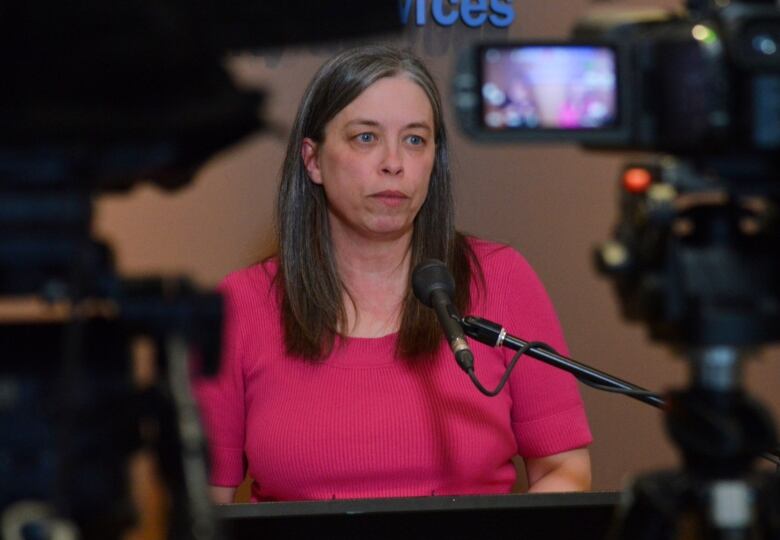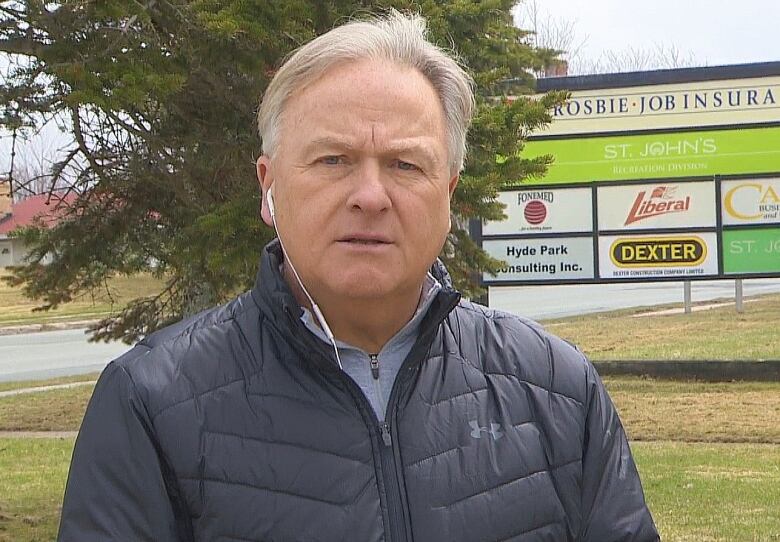The Dwight Ball Show: How the COVID-19 briefings took a political turn
While the Liberals look at reviving a leadership race, the outgoing premier seems to like his role

It was Monday, March 16, and the mood was tense. It was time for what was already becoming a habit: the daily update from Confederation Building in St. John's on COVID-19.
This briefing was different from the ones that had started only the week before.
Chief Medical Officer of Health Dr. Janice Fitzgerald, who had been addressing the media on the coronavirus, walked to the briefing room, but was joined by three members of cabinet, chief among them Premier Dwight Ball, whose appearance at the briefing he was about to close schools and launch a week of closures that largely remain in effect signalled that events had reached political significance.
Two days earlier, Fitzgerald had announced the first positive case of coronavirus in the province. It was not unexpected. Five days earlier, the World Health Organization had declared COVID-19 a pandemic.
"As a province and as a country and I guess as a world we are in unprecedented times," Ball said in his opening remarks. "These are indeed uncharted waters and in these times, these unprecedented times, they call for some important decision-making."
Ball showed up at the briefing because the coronavirus had emerged as not just the top priority for the government, but pretty much the only concern at the time. All other issues were either connected to the coronavirus (the collapse in oil prices, for instance) or simply eclipsed by it.
Ball went into that briefing in a remarkably unusual position. Just a few weeks earlier, he had effectively thrown in the towel, and announced that he would be stepping down, as soon as the Liberal party could find someone to replace him.
If COVID-19 had not happened, by the way, the day for that new leader to be picked would have been May 9 today.
Leadership campaign, like much else, was halted
It was not to be. The disease that has upended so many things around the world stopped the leadership race in its tracks, which left Ball sitting somewhat indefinitely as premier.
As things turned out, Ball stepped into a role during the COVID-19 briefings that suited him. As the world was, well, freaking out, Ball brought a sense of calm to the daily appearances. Reactions, of course, on social media never the best barometer, by the way, for measuring what the public actually thinks about actual things were divided. Ball has always had his haters, but it was evident in March and into April that a lot of people were impressed with Ball for trying to handle a crisis.

As the weeks passed, things evolved. The sense of urgency in the briefings has subsided. You can actually track them according to the number of active cases, which soared through the rest of March, cresting on April 6 at 192 cases.
I've had a pretty good sense in public interest in the briefings because we have real-time metrics of audience behaviour. Leading up to the briefings, which usually start at 2 p.m., there was a surge of online traffic as people clicked in to watch the live stream. After Fitzgerald's announced the headlines whether there were new cases, and how many people started to dial out. Quite a few stayed with the whole thing. The traffic pattern, day in and day out in those weeks, looked like a mountain.
Lately, it's been looking less like a mountain and more like a hill. There's still public interestin the COVID briefings, but it's certainly not as intense.
But here's the rub. While public attention might not be as acute as it was just weeks ago, the crises before the government are no less profound, if not overwhelming. Think about it: most parts of the economy are in grave shape, including the fishery, tourism, oil and much ofthe service sector. Our debt crisis continues to mount.
These challenges will need to be addressed, and it will not take weeks but months and likely years possibly a generation to reset things.
The premier as host
The daily briefings have evolved, too.Ball opens them with a welcoming remark, turns things over to Fitzgerald for her briefing, gives his own remarks (which sometimesresemble a political speech), introduces Health Minister John Haggie, who is there most days, and then goes to questions from the reporters who have phoned in.Sometimesthere are special guests, on topicsranging from seniors to mental health to food security.

It hasn't gone unnoticed in political circles that Ball, who otherwise would be giving his farewell speech this week, has grown quitecomfortable in his role as host of the daily briefing. It's given him a platform to talk directly to the public. Even though it was designed for questions from the media, the time for those has sometimes been squeezed to accommodate the government's messaging de jour.
Simmering away in the background has been a stalled leadership race and, possibly, some resentment among fellow Liberals that the regime change they wanted has also been stymied. There was also some yakking in the last few weeks about a supposed movement to draft John Haggie whose colourful quips and unshakeable resolve dominated many a briefing as the next premier.
There was no real movement, though. There were tweets and some political gossip, and the ever-colourful Haggie when asked by my colleague Ariana Kelland during an interview for a profile said he wouldn't rule out a bid if the Liberal leadership race was reopened.

"If the water on the beans changes in that regard, I'll certainly look at things again," he said a couple of weeks ago.
But it's the same water, and the same beans.
The party said no, and a few days ago party president John Allan made a point of saying there was no groundswell at all for a reopened race.
The next few days will be important. The party is set to reconsider the stalled campaign on this Monday. My colleague Terry Roberts reported that some in the party would like to have the leadership campaign concluded by the end of June, with voting happening online or by phone which is not that different than how many would have voted anyway but with no traditional meeting to crown a winner.
Candidates John Abbott and Andrew Furey parked their campaigns, and their ambitions, early in the public health crisis.
Dwight Ball parked his retirement plans. He has said since that he is prepared to stay on as long as necessary.
We may know by Monday how long that may be.













_(720p).jpg)


 OFFICIAL HD MUSIC VIDEO.jpg)
.jpg)



























































































